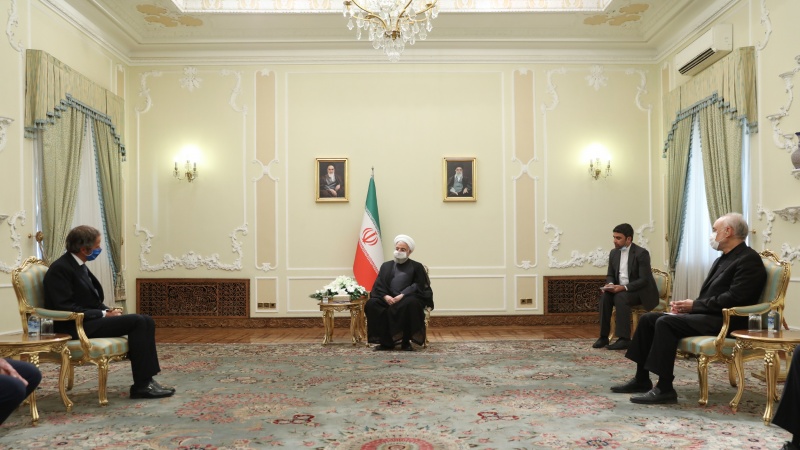Iranian President Hassan Rouhani has said that his country is ready to cooperate with the United Nations International Atomic Energy Agency (IAEA) within the framework of the safeguards agreement.
"In addition to its technical and specialized responsibilities in the field of safeguards and the Additional Protocol, which Iran voluntarily implements, the International Atomic Energy Agency also has an important responsibility in relation to the Joint Comprehensive Plan of Action [JCPOA] and the preservation of the multilateral document," Rouhani said in a meeting with Director-General of the IAEA Rafael Mariano Grossi on August 26, the official website of the Iranian president reported.
Rouhani said that cooperation between Iran and the IAEA will increase day by day, adding that “Iran is as ready as before to work closely with the Agency within the framework of the safeguards".
Later, Grossi and the head of the Atomic Energy Organization of Iran (AEOI) Ali Akbar Salehi issued a statement based on which Iran voluntarily provides the IAEA with access to two nuclear sites near Karaj and Isfahan, which the IAEA suspects once secretly hosted nuclear material or activities.
"After intensive bilateral consultations, Iran and the IAEA reached an agreement on the resolution of the safeguards implementation issues specified by the IAEA, in good faith,” the statement said, adding that the IAEA and Tehran agreed to further strengthen their cooperation and to build mutual trust to facilitate the full implementation of the Comprehensive Safeguards Agreement and its Additional Protocol, which has been provisionally implemented by Iran since January 16, 2016.
The Comprehensive Safeguards Agreement and Additional Protocol of the IAEA oblige Iran to fully declare its nuclear enrichment activities and offer assurances that the program remains within the constraints of the Nuclear Non-Proliferation Treaty (NPT). In June, the IAEA Board of Governors adopted a resolution criticizing Iran’s refusal to allow inspection at two of its nuclear sites, where undeclared enrichment has been reported.
Grossi, who was on a two-day visit to Iran, expressed hope that cooperation between Iran and the IAEA would ensure that all technical and professional issues and questions would be resolved through negotiations and added that “the JCPOA was literally a great achievement and a benchmark for all parties, and we have an important task to maintain it".
The JCPOA was signed between Iran and the five permanent members of the United Nations Security Council – China, France, Russia, the United Kingdom and the United States, plus Germany, in 2015.
According to the deal, which went into effect in January of 2016, Iran agreed to eliminate its stockpile of medium-enriched uranium, cut its stockpile of low-enriched uranium by 98 percent and reduce by about two-thirds the number of its gas centrifuges for 13 years.
The deal allows Iran to enrich uranium for 15 years up to just 3.67 percent, while prohibiting it from building any new heavy-water facilities for the same period of time. In addition, uranium enrichment activities were to be limited to a single facility that uses first-generation centrifuges for 10 years.
Following the withdrawal of Washington from the JCPOA in May 2018, Iran urged the deal's remaining signatories, to establish financial and trade mechanisms by which the country could get around the US restrictions. In May 2019, citing European countries’ failure to uphold commitments to preserve Iran’s economic benefits, Tehran began to reduce its commitments and resumed buildup of its uranium stockpile and enrichment levels.







 President Ilham Aliyev shed light on the evolving contours of the peace process with Armenia during an international conference in Baku this week. ...
President Ilham Aliyev shed light on the evolving contours of the peace process with Armenia during an international conference in Baku this week. ...
 Azerbaijan and Armenia started the process of demarcation of their border on Tuesday, with the installation of the first border markers based on ge...
Azerbaijan and Armenia started the process of demarcation of their border on Tuesday, with the installation of the first border markers based on ge...
 President Aliyev emphasized the critical role of the North-South Transport Corridor in fostering transport cooperation between Azerbaijan and Russi...
President Aliyev emphasized the critical role of the North-South Transport Corridor in fostering transport cooperation between Azerbaijan and Russi...
 Russian Foreign Minister Sergei Lavrov has reasserted that Moscow has no intentions to stop the fighting in Ukraine, even if peace talks commence.
Russian Foreign Minister Sergei Lavrov has reasserted that Moscow has no intentions to stop the fighting in Ukraine, even if peace talks commence.
 Iran has refuted reports of alleged damage to Shimon Peres Negev Nuclear Research Centre located southeast of Dimona, Israel, during the recent air...
Iran has refuted reports of alleged damage to Shimon Peres Negev Nuclear Research Centre located southeast of Dimona, Israel, during the recent air...
 Iran and Pakistan have signed eight cooperation documents in various fields, and agreed to strengthen ties to fight terrorism in the region.
Iran and Pakistan have signed eight cooperation documents in various fields, and agreed to strengthen ties to fight terrorism in the region.



